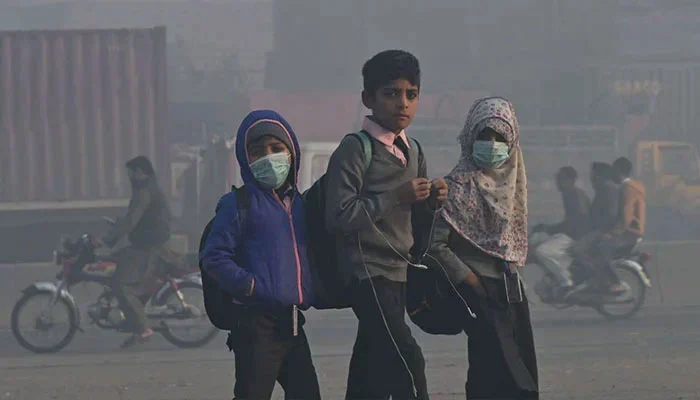The Punjab government has declared a health emergency in Lahore and Multan, the two cities most severely affected by the worsening smog situation, as efforts intensify to mitigate air pollution and its impact on public health. Senior Minister for Information and Environment Protection, Marriyum Aurangzeb, announced an extension of school closures in smog-affected areas across the province. “Schools will remain closed for another week due to the hazardous air quality,” she stated during a press conference. Colleges and universities will transition to online classes to ensure student safety.
Lahore continues to hold the distinction of being the most polluted city globally, while Multan ranks as the worst in air quality among Pakistani cities, according to Swiss group IQAir.
Lahore, a city of 14 million people with numerous factories near the Indian border, frequently ranks among the world’s most polluted cities. This month, it has reached record pollution levels, prompting authorities to implement extraordinary measures. The Air Quality Index (AQI) in Lahore dropped to 732 this morning before improving to 669 by 1 PM, as reported by IQAir.
In response to the severe smog, strict measures have been enforced, including school closures, a shift to online classes, and a ban on most outdoor activities until November 17 in eight districts affected by toxic air. Restaurants, shops, markets, and shopping malls have been directed to close by 8 PM. However, the persistent smog has led to an extension of school closures and the declaration of a health emergency.
Marriyum Aurangzeb also announced new operating hours for restaurants in Lahore and Multan, allowing them to remain open until 4 PM and offer takeaway services until 8 PM. “A full lockdown will be enforced in both cities on Friday, Saturday, and Sunday, as authorities continue to monitor the worsening smog situation,” she added, noting that the government will review data until Wednesday before making further decisions. Additionally, a ban on construction activities in the two cities will be imposed from this Saturday until next Sunday to reduce pollution.
Meanwhile, the Lahore High Court (LHC) has emphasized the need for a long-term smog control policy, suggesting a plan spanning at least 10 years. Justice Shahid Karim presided over the hearing on smog mitigation petitions, with Advocate General Punjab Khalid Ishaq present. The court directed the Advocate General to discuss a comprehensive smog control policy with Punjab Chief Minister Maryam Nawaz, highlighting the necessity of a decade-long strategy.
The Advocate General informed the court about the budget allocation for introducing electric buses in Punjab, expected to be operational by June next year. Updates from Khalid Ishaq included efforts to address flood situations, conserve rainwater, and tackle rising ground temperatures. Urban forestry work is underway, with a progress report due by March.
The court advised the government to study Beijing’s environmental improvement model and praised current initiatives. It recommended banning the establishment of housing societies on agricultural land, planting more water-conserving trees, and mandating water treatment plants for 10-marla houses. The court has requested implementation reports on smog control measures and adjourned the hearing until next week.










